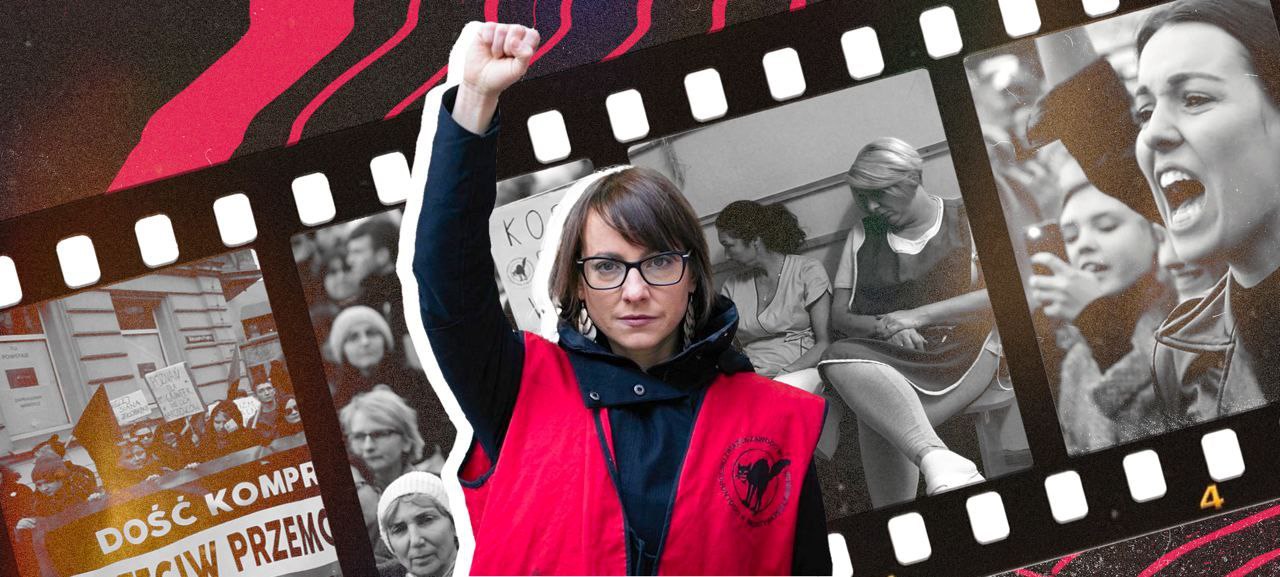The union has a female face, and this idea is perfectly captured in the documentary by Magda Maria Malinowska, a Polish filmmaker, activist, and member of The Workers' Initiative (Inicjatywa Pracownicza) trade union. Her film The Women's Strike Continues, presented at this year's Filma Festival, weaves together two lines of history: the struggle of female care workers in Poznan and the Black protests against the abortion ban in Poland.
In an interview for Commons Journal, Magda explains how activism and documentary filmmaking are reciprocal and shares her political hopes for the struggle of women around the world.
How did the idea of the film emerge? Why did you decide to intersect the topics of labour struggle and the struggle for women's rights?
I've been a labour union member for many years, and the struggle for workers and women's rights is the same for us. At one time, many of our union committees were completely feminized, for example, the committee at the Greenkett factory. In 2011, during the crisis, when most people were afraid of losing their jobs, the women workers of this factory organized a spontaneous strike. At the same time, together with the Feminist Analytical Center, we started supporting women occupying empty buildings in Walbrzych. Walbrzych is a mining town that has fallen into decay and depopulation after the transformation. The government privatized everything, e.g., mines, plants, and factories; consequently, unemployment was omnipotent.
Hundreds of families occupied the vacant buildings with the authorities' tacit approval. Many of them were single mothers, and when threatened with eviction, the women organized demonstrations and hunger strikes. Some of them managed to stay in their homes, but the media portrayed them as a social problem, with specific comments calling for sterilization. My colleague Gosia and I made a documentary about their living and working conditions. The work issue arose because there were only two state-run kindergartens in the city, and they were impossible to get into. When these women went to work in neighbouring economic zones, their children were left alone.
Eventually, one of the workers' children fell out of a window when she fell asleep at home after a night shift. The women wanted to organize a grassroots free nursery where they would take turns caring for the children. They worked in factories and warehouses with temporary employment agencies hiring them, so they had jobs one day and not the next, and sometimes they couldn't go to work because of their children. The free nursery initiative would have significantly improved their situation in the labour market. Still, the city prohibited them from implementing it, which would require the designation of one out of a thousand vacant buildings for childcare purposes.
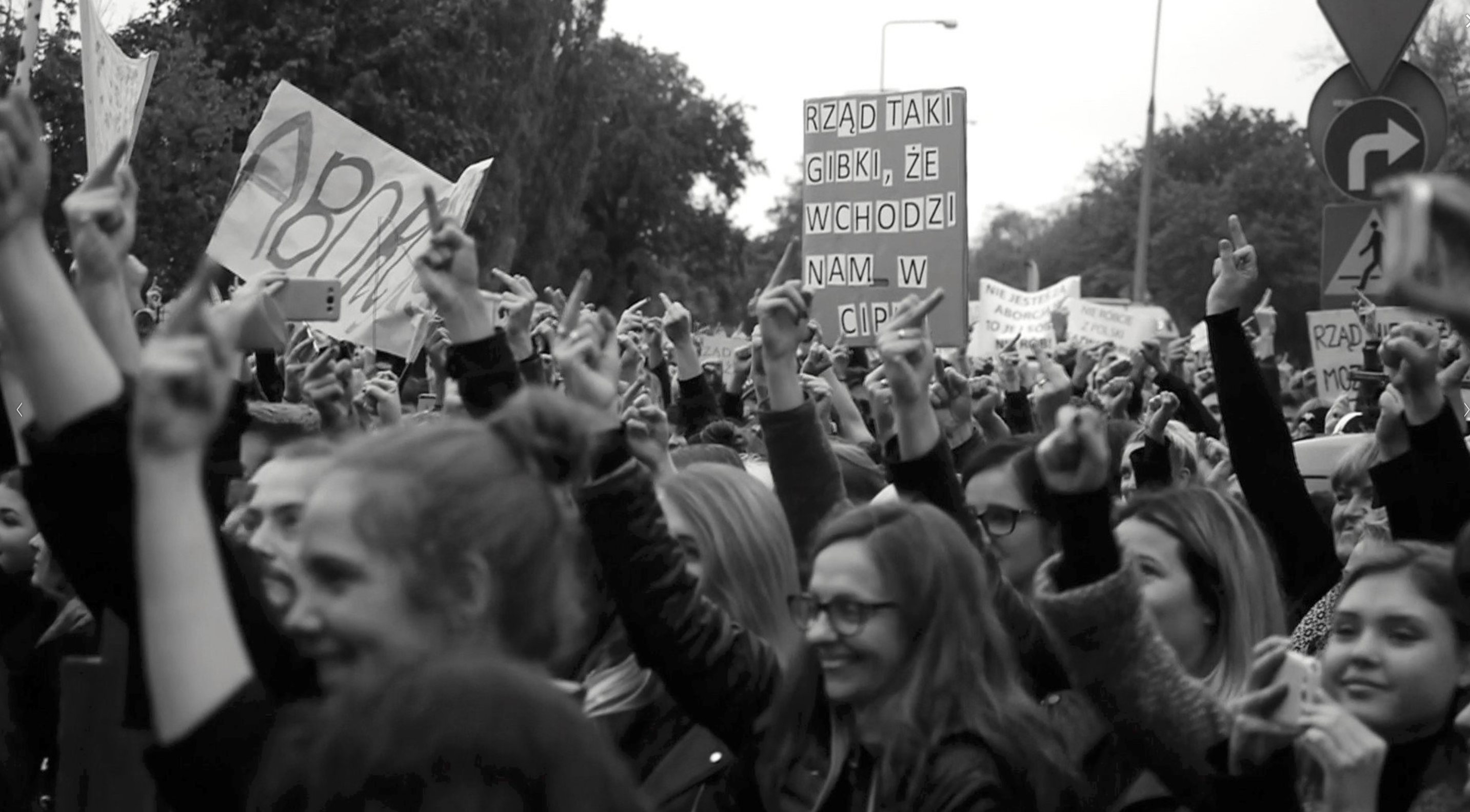
Screenshot from the film The Women's Strike Continues
In Walbrzych, interdependence was lucidly visible: unstable, low-paid work alternating with periods of unemployment, housing problems, and childcare crises. For women, it was a crisis in every sphere. In the same year, the government changed regulations regarding nursery care, extending the working hours for those employed in nurseries. At that time, the nursery workers joined us, demanding funding for childcare, constructing new nurseries, abandoning the institution's privatization plans, reducing parents' fees, and increasing wages. Initially, we expressed our support informally by participating in meetings at the mayor's office or organizing joint events, such as blocking tram tracks in the city centre. As we mention in the film, the city officials and council ignored the nursery workers, so the girls decided to act as a union.
Nursery workers were and still are incredibly active. Initiatives were focused not only on temporary wage increases but on changing the budget policy of the local government in general. And the girls had the support of parents and other groups of residents. At the time, Poland was facing a real crisis in the childcare sector. During the transformation, more than 70% of kindergartens were closed. This infrastructure was not rebuilt for many years but somewhat further deteriorated, shifting the burden of these decisions onto women. It had to end with an outburst of anger and protests. Because the girls had an incredible amount of energy, they also connected general problems related to the care crisis with their working situation. I tried to film actions organized by them or their participation in meetings at the city hall.
In 2017, the struggle was still ongoing; the new president [Poznani] promised to increase the budget for care but did not fulfil this promise, refusing to raise employee salaries. In addition, the Polish Women's Congress, which considers itself the voice of all women in Poland, awarded him, the one who cheated his workers, the prize for the most gender-equal president in Poland. Feeling the need for a platform to restore the discussion, we decided to create a movie that shows the situation in the city and highlights the conflict. Even before the completion of the installation, protests from parents of children with disabilities began, and subsequently, protests against increased abortion restrictions.
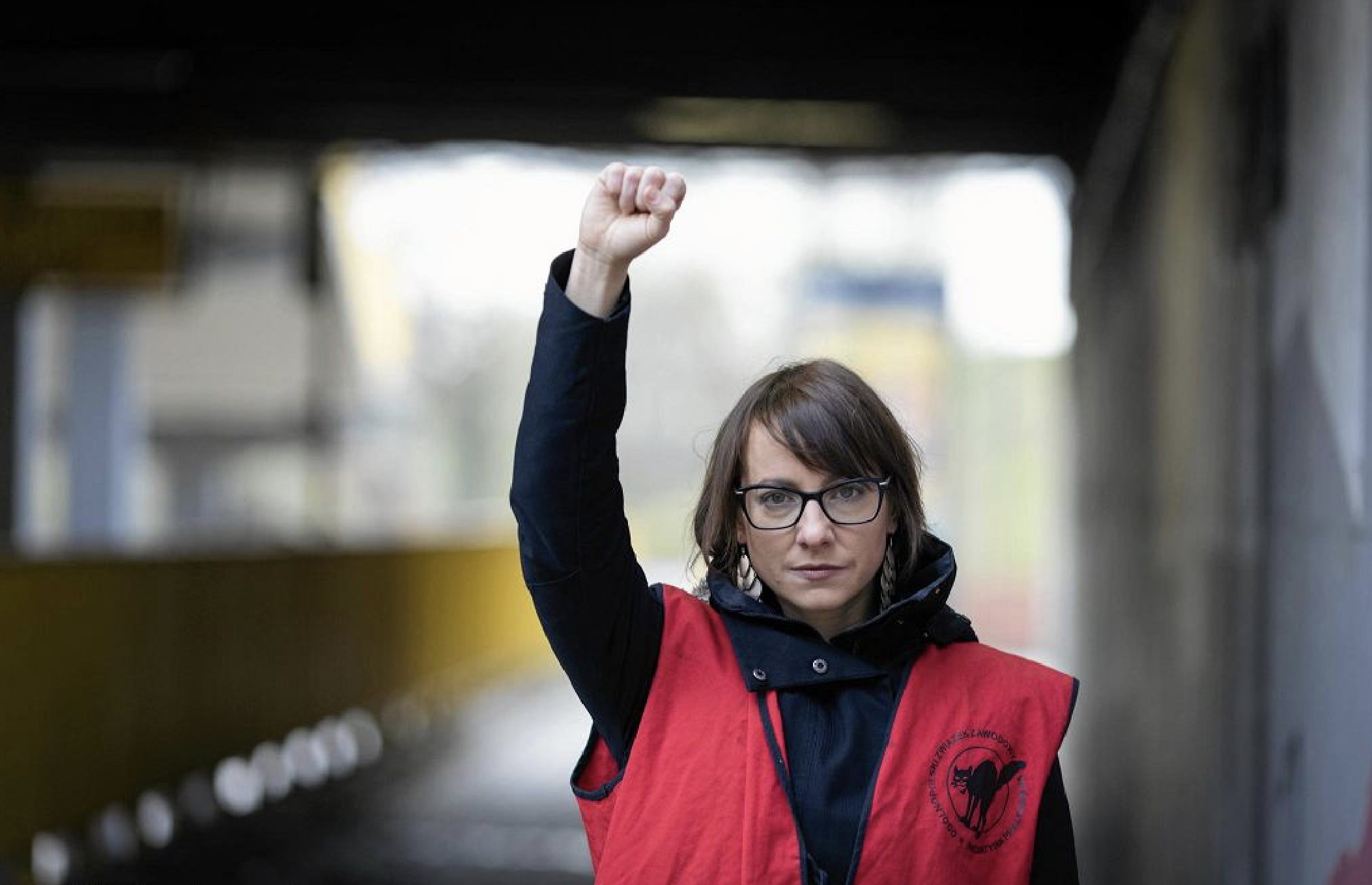
Magda Maria Malinowska. Photo: Lukasz Cynalewski / Agencja Wyborcza.pl
It is all naturally interconnected. For me, it was the culmination of everything. Further cuts in the care sector, exhausting work for pennies, meagre support for people with disabilities and their families, rising rents, and a constant struggle for survival and making ends meet. And at the same time, forcing women to give birth even to very sick children despite the threat to their own lives.
At the largest protest in Poznan in 2016, nursery workers, including those you saw in the film, gave speeches, stood with banners, shouted through megaphones, and later rescued gas-exposed and fainting female protesters. Wonderful women.
In the movie, we portrayed the strike of women's struggle for decent pay for reproductive labour through the rally against the abortion ban bill: black and white footage of the Black Protests frame the movie at the beginning and the end, highlighting the relationship of one to the other. How did the success of the trade union struggle influence the Black Protests?
The nursery workers threatened Poznan councillors with a strike, which is not a metaphor and indeed happened, although strikes in nurseries are not usual. Strikes in Poland, in general, are rare due to regulations that effectively limit them. Moreover, they were the first in our union to demand a reduction in working hours to 25 hours per week. It is now easier to talk about the need to reduce working hours, but it was a radical demand back then. Combining the threads of labour struggles in the care sector and the Black Protests, under the slogan "The Women's Strike Continues," I wanted to show that women are currently forced to fight constantly at work and at home. Ultimately, they rallied for access to medical care because abortion is de facto a medical procedure. Well, first, they do all the reproductive work that keeps us functioning, then they work for wages, and they also take to the streets.
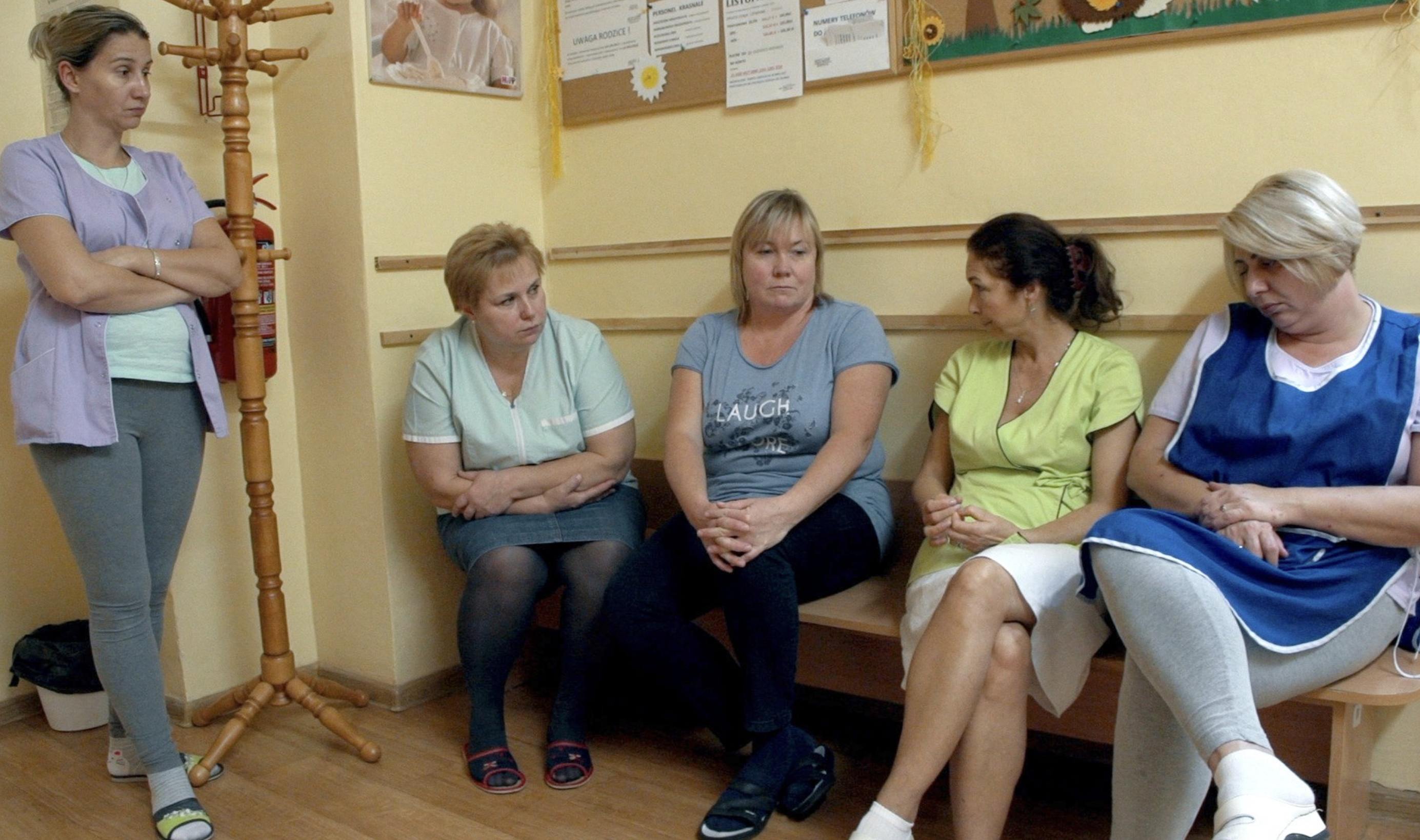
Kindergarten workers in Poland. Screenshot from the film The Women's Strike Continues
This female energy is so palpable that all political parties participating in this year's elections, except for the far right, addressed their messages to women. It was significant that at the most prominent opposition rally, male politicians spoke to women, encouraging them to vote, but they didn't allow their female colleagues to speak for themselves. Instead, they wore red shirts symbolizing love, equality, freedom, life, etc. So, women's energy is palpable, but unfortunately, it is heavily instrumentalized.
What has changed regarding women workers' rights in Poland since the film's release?
In terms of specific rights, there haven't been any revolutionary changes specifically for women; however, it would be a lie to say that nothing has changed. The Worker's Initiative (Inicjatywa Pracownicza) union, to which I belong, continues to grow with new workers joining, and we are now around 6,000 members.
This year, we organized the Social Congress of Women again, with over a hundred women from different workplaces and unions. We had precious discussions at a symbolic level and in developing tactics and plans for future actions. It turned out, for example, that it's not just us — female factory workers or warehouse workers — who demand research into the severity of our work. The caregivers demanded the same from another trade union in nursing homes. One of their colleagues injured her spine at work while lifting a heavy patient.
Furthermore, thanks in part to our efforts, the number of children covered by public nursery care has increased in recent years. There has been an alteration in thinking about care as a cost that one should lay on the shoulders of the household budget. For a few years, there has been a change in the rhetoric regarding social support for families with children. When the right-wing government lowered the retirement age and introduced the 500+ program (a child benefit program), liberals swore that it would ruin the country and that the benefits should be immediately abolished. Currently, few would question this benefit. This time, before the elections, parties argued about who would increase its value faster. Unfortunately, after years of protests, abortion rights were further restricted. This has a massive impact on women's access to healthcare when they become pregnant.

Kindergarten workers in Poland. Screenshot from the film The Women's Strike Continues
My colleague from the union once heard from a gynaecologist that now, in Poland, women have to give birth to everything, so there's no need to worry about them: you can have prenatal tests done, but no matter what the results are, you still have to give birth. If the fetus dies, you must continue the pregnancy, regardless of the risk of sepsis and death. Doctors shouldn't take on complicated pregnancies because if something goes wrong, they won't be able to terminate it to save the woman's life. Ultimately, it's better not to get pregnant and not give birth, even if you want to, because if something goes wrong, you're on your own.
I know several women who wanted to have children but had to terminate their pregnancies abroad due to complications because if something happened, they wouldn't get help here. Women with non-viable pregnancies also travel abroad. For them, it's a double tragedy — not only does the desired pregnancy end, but they also have to seek help abroad because they risk sepsis in Poland.
Sylvia Federici's voice as an American woman has authority and sets the framework for events in Poland. The American as universal and the Polish as local come together in this film. We also know you had a long and successful legal battle with Amazon after being illegally fired. Protests and strikes against Amazon are usually also related to working conditions, wages, and workplace safety. How important is international solidarity for you, and what is the big difference between Poland and America?
The interview with Federici was conducted long before the idea for the film was born. We did it with my friend Krzysztof, who translated the Caliban and the Witch. We did this to expand the discussion on the role of unpaid labour in capital accumulation. Silvia, who co-founded the Wages for Housework movement, is a skilled theorist and a practitioner with experiences that we lack, making her an essential voice in this discussion.
Of course, solidarity across borders is more than just an exchange of experiences. Indeed, after being fired from Amazon, I received immense international support. My union put in a lot of effort to publicize this issue. It was important because Amazon tried to discredit me as socially harmful, violating social norms and the so-called “all moral principles," endangering other employees. In October, a first-instance court ruling reinstated me to work. However, I expect an appeal.
At Amazon, we distinctly experience how cross-border action is needed. We have similar working conditions and Amazon's policies regarding workers and trade unions everywhere across the network. We know that Amazon uses national borders to divide, weaken, and squeeze as much as possible out of us.
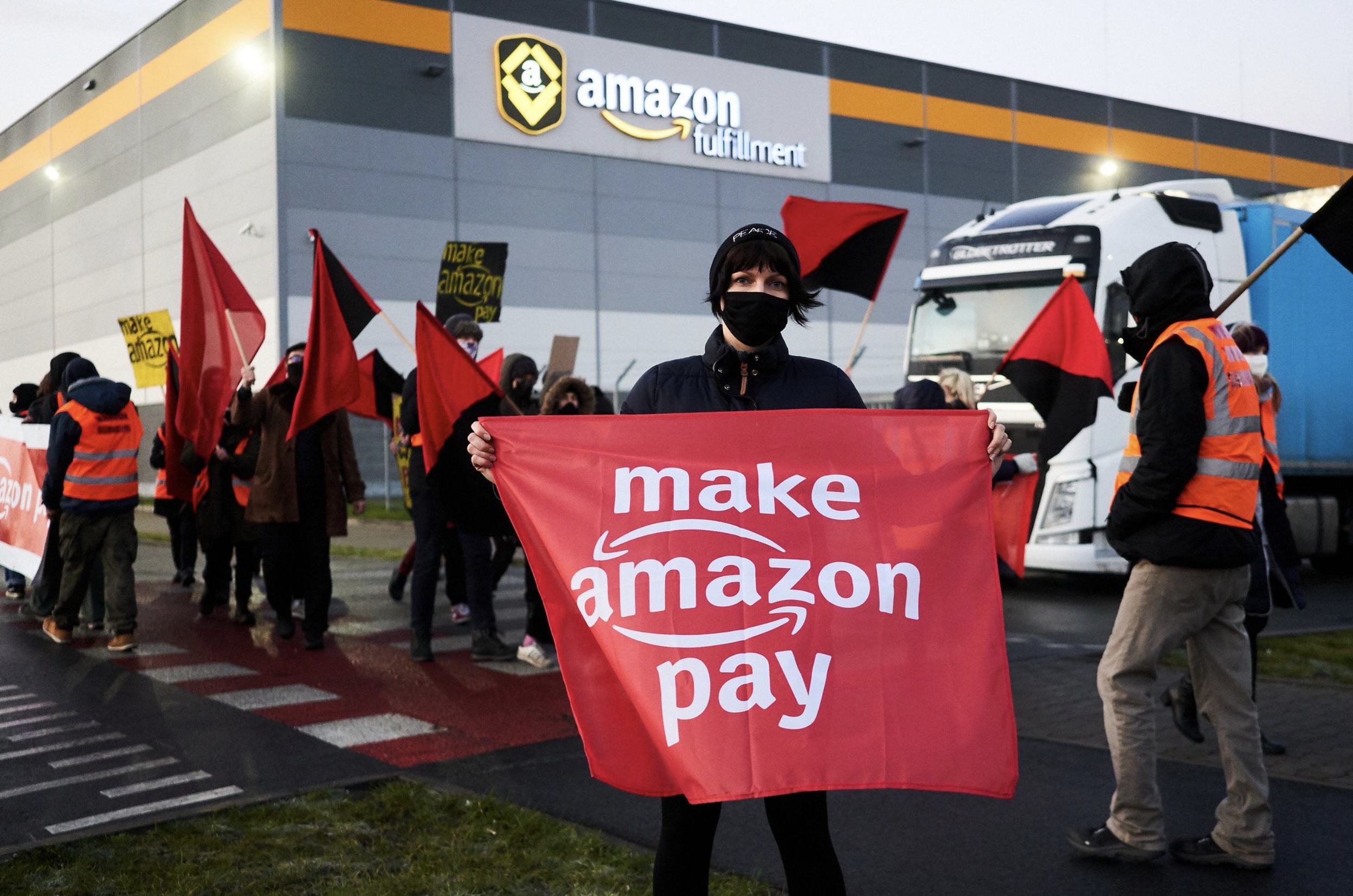
The protest of Amazon workers. Photo: from open sources
When German workers go on strike, Amazon shifts orders to Poland, where they announce additional working hours. In 2015, workers at the Poznan warehouse rebelled, and during the strike in Germany, they slowed down work. But generally, our wages are so low that a significant group is happy to work overtime. Therefore, it is in the interest of German workers that we earn more and do not agree to overtime; they need our support for their wage demands, and we need their support when they strike for higher wages in Germany.
We have created the Amazon Workers International, where workers from Poland, Germany, France, Italy, the USA, Spain, Slovakia, and many other countries are active. We are not interested in union bureaucracy; we unionize the rank-and-file workers on the shop floor. Perhaps we do not work together every day. Still, during the pandemic, we realized that in crises, years of building bonds, meetings, and information exchange enable quick and efficient joint action, thanks to which we can exert intense pressure and achieve our demands.
Almost everywhere in the world, women from working-class families (let's simplify and call ourselves just women) bear the yoke of unpaid work. In some countries, there is less, and in others, much more, but it is a common, global problem. Women bear the consequences of crises, social cuts, and privatization to a large extent. In a capitalist economic system, especially, it is exceptionally oppressive towards women, destroying our lives. That's why women are a group that has great potential to change this system. We need social and communal, not free-market social relations to function normally, not to toil like oxen at home and work.
This feminine energy burst out in Poland recently. Nowadays, it is global and certainly provides a field for building solidarity — including with Ukraine. As a union, we try to act within the aid convoy for trade unionists from Ukraine. We're on the same wagon. Of course, living conditions in Ukraine are much more complex, and Poland has no war. However, our countries are a reservoir of cheap labour for Western and Asian corporations. Both countries' social, political, and economic situation strongly influences each other. Sometimes, it is very tangible; for example, iron ore from Kryvyi Rih goes to Polish steelworks. We must cooperate closely with anti-authoritarian social movements, trade unions, and organizations.
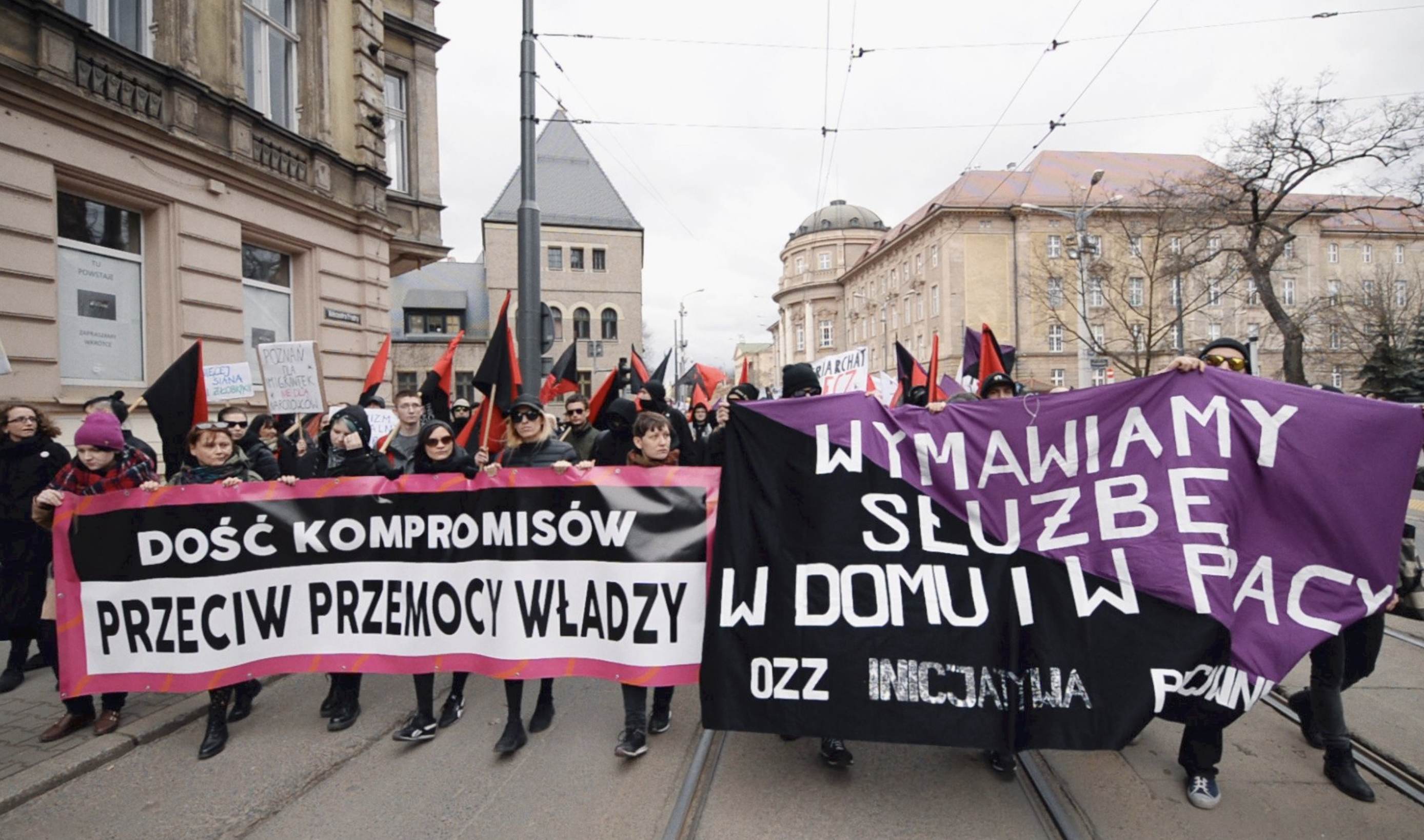
Screenshot from the film The Women's Strike Continues
I believe that currently, there is no such thing as a united international working class that can ignore the local context and act only for global equality against global capital, so we should always act in the interest of the worldwide working class, even if it is not in the interest of local workers. It sounds beautiful, but it doesn't exist in reality. In everyday life, we function in a local context. That's why, as Poles, we are not fighting against the EU, which some comrades in France or Germany don't understand. In Germany, the issue of Palestine and Israel is more complicated, and in Ukraine, the left adopted a strategy of supporting the front. We know that many left-wing circles criticize this. As for me, I don't feel entitled to tell others what to do in extreme situations without living in their local context.
The discussion about Ukraine is a bit stuck in muddy opinions about whether to demand peace at any cost, surrender, or support the front. I understand that the left has almost no influence on this, so this dispute is ultimately unproductive. At the same time, it escapes notice that in Ukraine, military and economic forces clash. The outcome of these clashes can profoundly impact the shape of labour and social relations in Europe, especially Eastern and Central Europe. That's why we should stick together in this battle and support it.
The question is whether Ukraine will undergo another accelerated shock therapy or whether it will be able to use the wartime turmoil and sense of community to challenge individualistic, free-market relationships in favour of a society based on self-governance and the equal distribution of goods.
In 2022, the idea for a film came up on how war affects the world of work and about its transformations, problems, needs, how it organizes itself, and how it will all end. Or maybe how it will begin.
You are an activist. Sometimes, a filmmaker is alienated from his subject matter, but undoubtedly, you are not. How does it affect your films?
That is an excellent question. A few days ago, I read a critical article about documentary cinema in Poland by Slovakian film researcher Jadwiga Kutkova. In her text, she raises the question of why Polish documentaries are far from Polish reality and why many Polish directors address exotic topics in their documentaries, such as the fate of poor children in Africa, while ignoring their local reality. Her criticism was that people travel abroad for material and that filmmakers avoid deep exploration of social and political issues in documentary cinema. When a filmmaker is an activist, they automatically label them as not being a filmmaker in the first place, and their films may not be objective. However, we know that films are never accurate. Even in film school, they teach that the idea of objectivity in cinema doesn't exist.
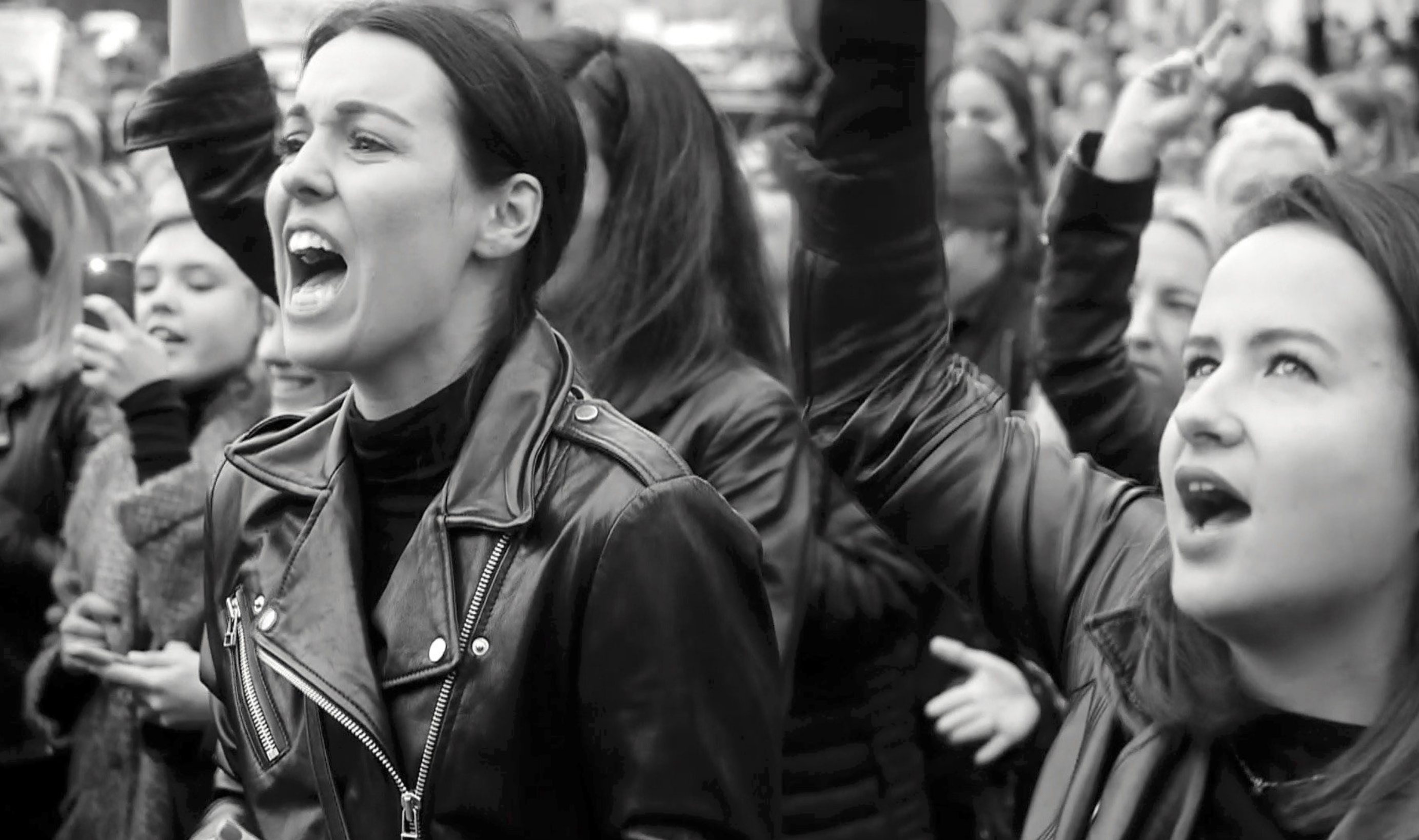
Screenshot from the film The Women's Strike Continues
But still, there's this concept that you must keep your distance. But if you have distance between your characters and the topic in the movie, then the problem is how deep you can get inside. When I was in Wajda School, I heard so many times from different people that I had to stop; I had to cancel my activism and start to be a filmmaker.
There is a Polish director, Eliza Kubarska. She has made some outstanding films, one about alpinism because she is one. Her work tackles some social issues from the shared perspective, but in her interviews, she often mentions that she tries to keep her distance. Therefore, she chooses to make films abroad to ensure this distance and mentions that she is not an activist, just a filmmaker. For her, film is a tool, and she refrains from activism, which stems from a deep conviction that you cannot simultaneously be an activist and a filmmaker.
And somehow, I agree with this. I mean, when you watch films made by activists, it's usually just a report from a protest, a collage of information. We can talk to people from our union, for example, or our group. People often ask me: "Oh, you've done some interviews, so now you can make a movie." But it takes more work. Even if I have interviews, it takes years to make a movie out of them, get inside the problem, and make the necessary impression and impact on the viewer.
Otherwise, we get ideological and dogmatic movies or merely portray protests. It's also vital to archive protests, people's demands and problems from our perspective and record what people around us want to say. But there's a difference between those archive materials or videos that we sometimes have to make very quickly to inform society about something and movies. I am convinced that we cannot distance ourselves. So, we have to accept it and dive deeper and look at some issues from a broader perspective. Only when we are part of something can we go genuinely deep.
For example, I would have made the film The Women's Strike Continues differently if I would do it now. At the time, the goal was to show these people's problems and highlight how local authorities ignore these problems. And to point out why we must change our thinking about the care sector. I usually filmed the film's protagonists during the day – at home, at work, and at events. To record inside kindergartens, the workers agreed with the directors to let me in for a few minutes. Of course, I could only do this when the children were asleep. That's why, sometimes, it seems that their work is not that hard. When I edited the movie, they asked: "Magda, why didn't you film us at work?". For them, it was essential to exhibit their workplace. For me, it was not so apparent at the time. So now I would shoot them mainly in the workplace.
When I started working at Amazon, I realized it was important to show the workplace from the inside. Of course, this is only sometimes possible because it would be a huge problem for employers to show the reality of people in the workplace. At least, it is worth starting a discussion about how to show it. When we film ourselves, our work, and our community of employees, we actually break the idea that the workplace is just private property.
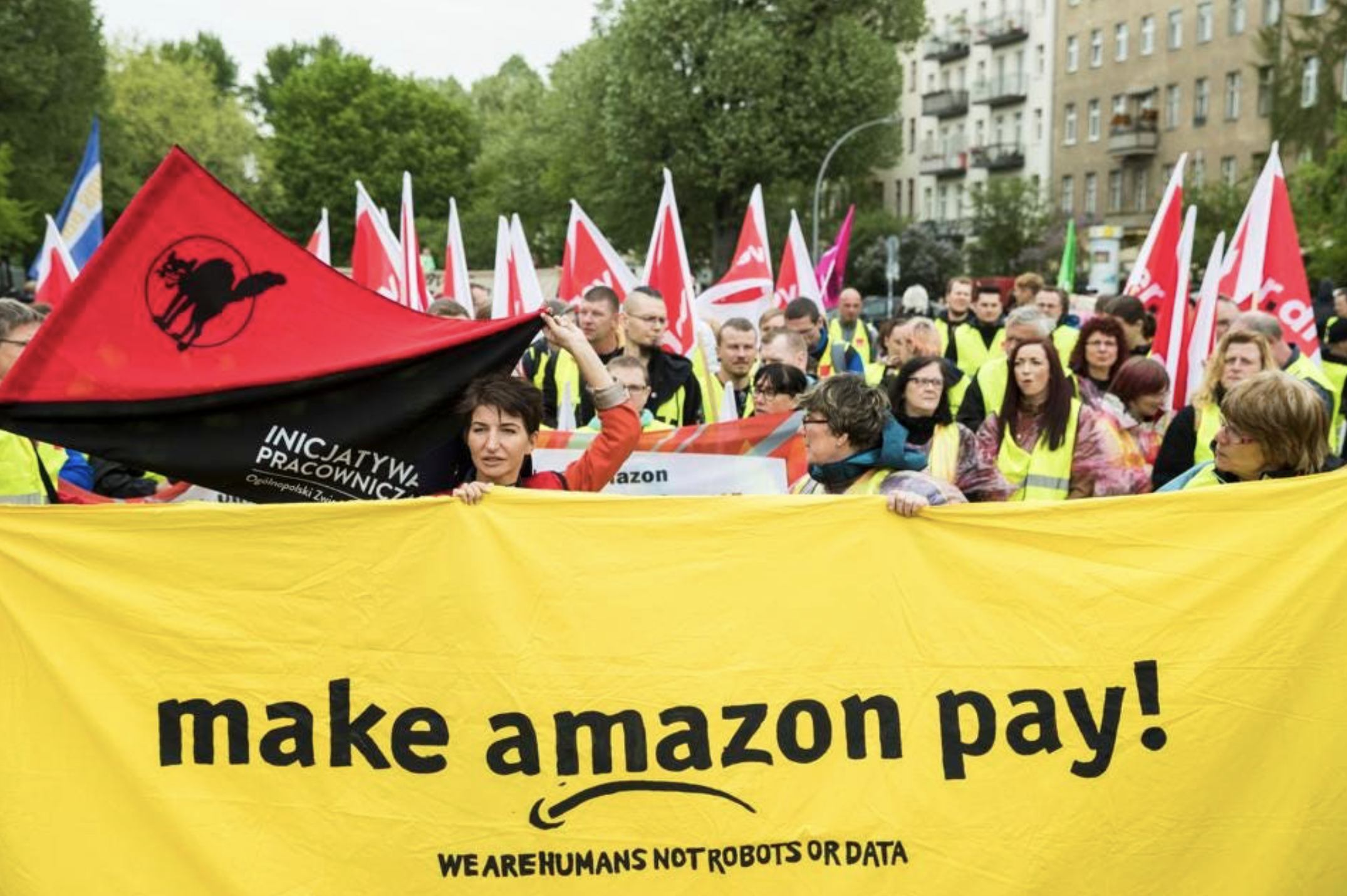
The protest of Amazon workers. Photo: from open sources
We spend many hours at the workplace, losing our health and building community relationships. An employee is not only a part of the employer's private property but he or she is also a social being in the workplace. And we should see workplaces as part of public life, not just private property.
Nowadays, the world of documentary cinema is also affected by individualistic thinking. We can see this in documentaries focusing on one or two people and delving into their psychology and mentality. Sometimes, it's like auto-therapy for the director or for who is like the hero. That's why there are so many personal documentaries. Many laws also protect personal privacy, our individual rights, and our right to be the author of a film. However, no right enables the portrayal of the worker at her workplace to show her body, work, and relationships with colleagues because that would break the idea of privacy.
We perceive the documentary world from a capitalist perspective where an individual's work is not that important. However, the question of what is a workplace doesn't exist in this domain of documentary because it doesn't escape the enterprise. We don't build communities. We don't exist as communities. These are also good examples that show the connection between society and how it is organized, as well as between documentary and culture. As much as the culture of a society has a great impact, perhaps the society and the organization of our society have an even greater effect on documentary filmmaking. Documentary filmmakers don't realize properly why they make films on these or those exact topics. Sometimes, it is not a personal choice but has a much bigger context. This context has to do not only with the fact that we have this kind of education and that directors usually come from middle-class backgrounds. But also, because we live in a capitalist society organized by a free market, private property is the most important thing, more important than workers' health, subjectivity, and dignity.
What advice would you give to an activist who wants to make movies?
We have to provoke thinking about many different things, such as the law about private property, and we can do it in various ways. Sometimes, it's good to make even a very simple, short movie, but try to break some standards and push the discussion about some structures you challenge.
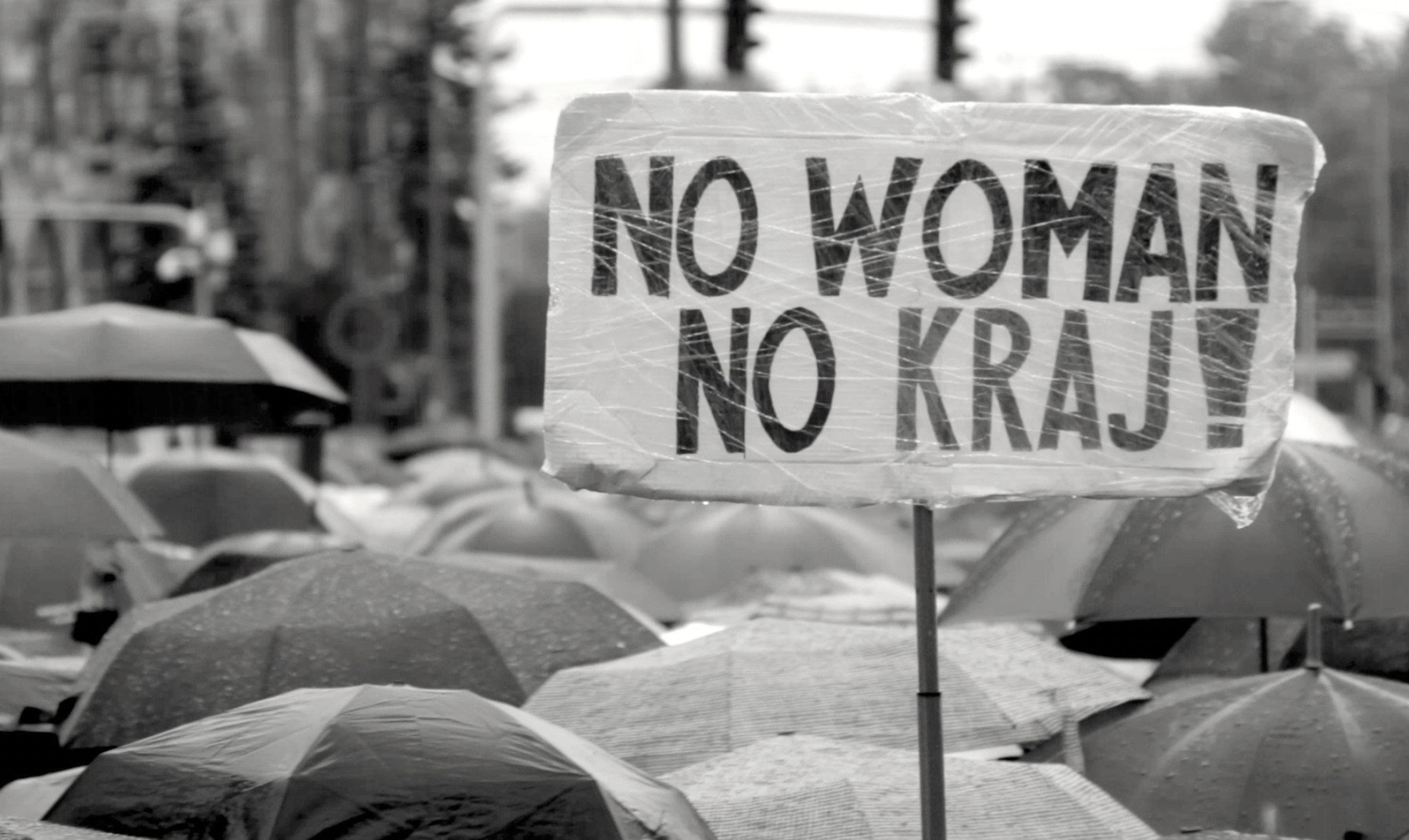
Screenshot from the film The Women's Strike Continues
We have to trust people who watch those movies and trust our society's ability to reflect independently. Our role is to provoke their thinking while changing some norms and standards.
My advice is to question the whole structure of the film world: the norms and the rules by which you make films. We shouldn't stay marginal. So then there's another question: How do we go mainstream? We can go to mainstream challenging mainstream, keeping the movie lucid for the people.
We have to provoke the film industry and culture, its mainstream, to start changing the rules of this world. The organisation of the film world, what we can show and cannot, symbolises how our society is structured.
The film ends with shouts, "This strike is precautionary; now it's time for a general strike". What political hopes do you have for the struggle for women workers' rights worldwide?
I have great hopes for the workers' struggle, although I know that change takes time. My mom recently told me that she didn't join the union at her workplace because she no longer has the motivation to act. She fought during martial law and gave a lot to that fight, and now, every day when she goes to work, she feels that their struggle failed. It was supposed to be beautiful, prosperity, freedom, and justice, but it's completely different: exploitation, inequality, hustle, and lack of stability. If we give up, we will lose if we let ourselves be fooled and deceived like Polish workers in the 1980s. As a movement, we must always be in this process. Its stages are different; sometimes, we are weaker, sometimes stronger, but we cannot give up. Giving up means that instead of moving forward, we move backwards, and when we are already moving backwards because we have moments of weakness, we take five steps back instead of two.
Sometimes, I miss more discussions about what we want and how we imagine it. How do we imagine Ukraine after the war? What would it be like for workers to live well there? How do we imagine organizing work in the plant where we work so that we go there more enthusiastically? How do we imagine municipal budgets, public space, support for agriculture, a healthy environment, the organization of our common courtyard and changes in work or job positions? Most often, we share problems, though, after that, we sit in front of the TV and watch movies or series in which the protagonists are often Western middle-class individuals. Are we able to imagine life without capitalism, without private property? I want our documentary films not only to show the miserable and challenging lives of workers or workers' protests in reaction to something. I would like them to provoke a change in thinking about the world, to break something and bring us closer to a world without exploitation. I know that a film alone will not change anything. However, it is a tool that affects collective thinking. Popular culture shapes specific views, norms, and customs. Thanks to the film, we can introduce some ferment into it.
